Wright In Japan
March 19-29 2025
11 days | Max 20 guests
Wright In Japan
The Architect's Eastern Vision
Wednesday, Mar 19, 2025: Depart
Travel from your gateway overnight to Tokyo.
Thursday, Mar 20, 2025: Arrive Tokyo
Upon arrival, transfer to the Imperial Hotel, located in the sophisticated Hibiya neighborhood, on the border of Ginza—Tokyo’s shopping and dining epicenter—and within walking distance of the Imperial Palace. Meet Frank Lloyd Wright Trust Travel Manager and tour director Risa Sekiguchi (a Japanese native) and join your fellow tour members for a welcome dinner and drinks at one of the hotel’s fine restaurants. Relax and enjoy the glamorous décor and contemporary Japanese fare—which incorporates ingredients and influences from the West—while getting to know one another.
Imperial Tokyo | Dinner
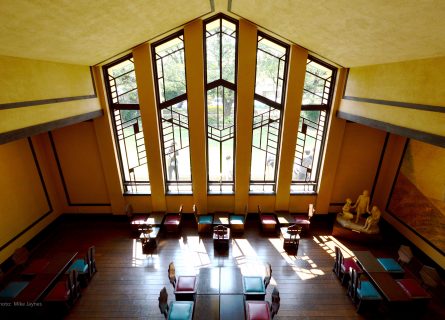
Friday, Mar 21, 2025: Tokyo
After breakfast, explore Tokyo—a provocative mix of traditional and contemporary Japanese culture. Learn about the history of the former Imperial Hotel, Wright’s most important Japanese project, including the atmospheric Old Imperial Bar, which features several significant pieces from the original structure. Then, board a bus for a lecture on Frank Lloyd Wright and his trusted Japanese apprentice, Arata Endo, followed by an in-depth tour of their joint project, the Jiyu Gakuen (Freedom School) complex. This post-Prairie design embodies Wright’s vision of progressive education. The school was founded in 1921 as a middle school for girls by Motoko and Yoshikazu Hani, whose dream it was to create a place where children could learn to think for themselves. To accommodate a limited budget, the beautiful design makes use of humble materials in ingenious ways. Savor lunch amid a glorious Japanese garden before continuing to the Tokyo Metropolitan Teien Art Museum, housed in a former Imperial villa in a delightful high Art Deco style that combines the best of French and Japanese motifs. Return to the hotel for an evening at leisure. Choose from one of the excellent restaurants within the hotel itself or venture out for an exploration of Tokyo’s world-class cuisine.
Imperial Hotel | Breakfast, Lunch
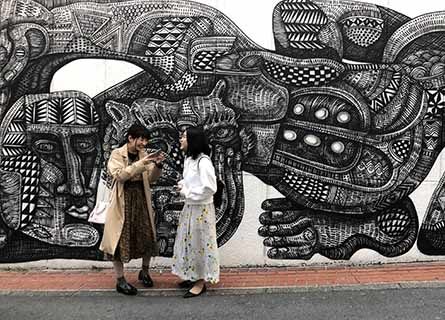
Saturday, Mar 22, 2025: Tokyo
Continue your exploration of Tokyo. Learn about Wright’s career as an art dealer and his obsession with Japanese woodblock prints during a visit to the Sumida Hokusai Museum. Here, we learn about the life and art of Katsushika Hokusai, one of the leading practitioners of the art form. Next, visit Meiji Jingu Shrine, dedicated to the deified spirits of Emperor Meiji and his wife, Empress Shōkena. This Shinto shrine sits in a 170-acre forest oasis, just a few blocks from the epicenter of contemporary Japanese fashion and teenage culture: The trendy Harajuku neighborhood. Here we enjoy an okonomiyaki (savory pancake) lunch. Afterwards, stroll along architecturally-rich Omotesando, arriving at the Nezu Museum, rebuilt in 2009 by Kengo Kuma. Enjoy the museum’s important collection of traditional Japanese art—as well as its exquisite Japanese garden—before returning to the hotel. The evening is at leisure.
Imperial Hotel | Breakfast, Lunch
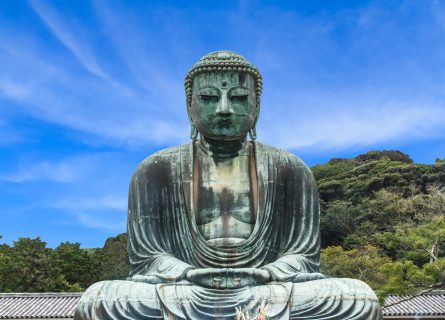
Sunday, Mar 23, 2025: Tokyo/Kamakura/Hayama/Hakone
After breakfast, travel overland to Hayama for an exclusive visit to the privately-owned Kachi Villa, built in 1928 by Arata Endo. The sprawling villa―which retains much of the original furnishings―is the architect’s most important existing residential building. Next, travel to Kamakura, once the seat of the Shogunate from 1192-1333 and now a picturesque resort town by the sea. See the Kamakura Great Buddha, where Wright sat for a portrait in 1919. After lunch, continue to Hakone, a hot spring resort area popularized by Japan’s first Western arrivals. Take a boat ride on Lake Ashi and climb aboard a cable car for a dramatic view (weather permitting) of iconic Mt. Fuji. Then, check in at one of a traditional ryokan (Japanese style hotel) to sample refined Japanese living at its best. Don a traditional yukata (cotton kimono) for a stroll along garden paths and soak in one of the onsen (hot springs), whose mineral-laden waters have numerous health benefits. In the evening, enjoy an artful kaiseki (multi-course banquet) meal.
Hotel Kowakien Ten-yu | Breakfast, Lunch, Dinner
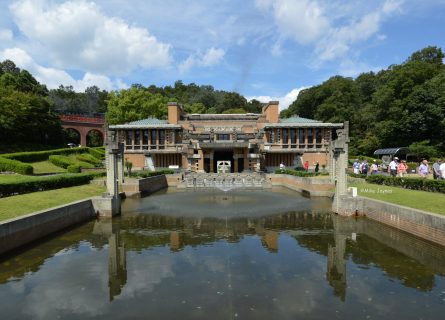
Monday, Mar 24, 2025: Hakone/Nagoya
After a traditional Japanese breakfast (and perhaps another onsen soak), travel to nearby Odawara station to board the shinkansen (bullet train) to Nagoya, enjoying first-class comfort. Board a bus and leave the city limits to see the preserved lobby portion of Wright’s Imperial Hotel at Meiji Village, a 250-acre open-air architectural museum of over 70 buildings, including homes, factories, businesses and churches. Learn how the lobby was saved and rebuilt here and how Wright’s innovative and radical design contrasted with the earlier Meiji style. You will have time to have lunch and explore the park on your own. Return to Nagoya, where your evening is at leisure. Our 5-star hotel is located in the Nagoya station building, which features a wide array of shopping and dining choices.
Nagoya Marriott Associa Hotel | Breakfast
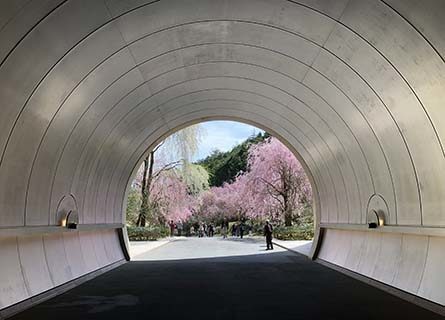
Tuesday, Mar 25, 2025: Nagoya/Shigaraki/Kyoto
Travel overland through scenic rural vistas to the I.M. Pei-designed Miho Museum, hidden deep within a nature preserve in Shigaraki. The ambitious 1996 project was designed to assimilate the buildings—80% are located underground—to blend with nature. After lunch, continue to Kyoto, the heart of traditional Japanese culture and our home for the next four nights. This elegant city was once home to the Imperial family and was Japan’s capital from 794-1869. Here, Wright absorbed traditional Japanese culture and aesthetics, which remained with him for the remainder of his career. After lunch overlooking a splendid garden, visit Sanjusangendo—first built by retired emperor Goshirakawa in 1164—to see 1001 statues of Kannon and 36 splendid statues of Buddhist deities (all National Treasures). Then, visit the Memorial Hall of Kawai Kanjiro, the home and studio of the potter who served as a central figure in the Mingei (folk craft) movement, a close ally of the Arts & Crafts movement. After checking into our hotel for a well-deserved rest, venture out on your own to explore Kyoto’s dining and nightlife, located just steps from the hotel.
Kyoto Hotel Okura | Breakfast, Lunch
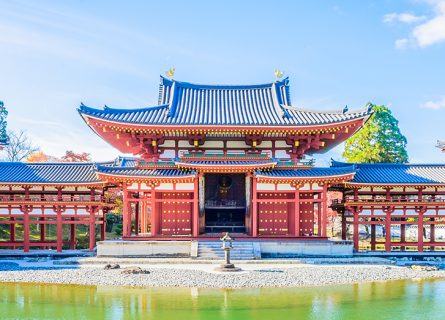
Wednesday, Mar 26, 2025: Kyoto/Uji/Nara/Kyoto
Depart for a full-day excursion to Nara, Japan’s first capital. On the way, stop in Uji—a famous tea growing region—to see Byodo-in, first built as a rural villa in 998 and converted to a temple in 1052. Its exquisite Ho-o-do (Phoenix Hall) served as the model for the Ho-o-den Pavilion that enchanted Wright at the World’s Columbian Exposition in 1893. Continue to Nara for a stroll through Deer Park before seeing the early 8th-century Great Buddha at Todai-ji Temple’s main hall. After lunch, travel to Oyamazaki City to see Chochikukyo, an eco-friendly house designed and built in 1928 by architect Koji Fujii for his own use. Fujii, who was influenced by C.R. Mackintosh as well as Wright, created a design that artfully blends traditional Japanese and modern elements. Return to Kyoto for an evening at leisure.
Kyoto Hotel Okura | Breakfast, Lunch
Thursday, Mar 27, 2025: Kyoto
Wake early for a full day’s exploration of gardens, Buddhism and more. Take in the Zen aesthetic of “less is more” at Ryoan-ji and Daitoku-ji temples, home to some of the most important karesunai (dry landscape) gardens and austere teahouses in Kyoto. Many of Wright’s spatial design principles—as well as tenets of classic Japanese architecture—are evident here. After a temple-style vegetarian lunch within Daitoku-ji’s grounds, visit Nishi Honganji Temple for a tour and green tea experience led by a resident monk. Then, enjoy a private tour of the Sumiya Motenashi Art Museum to see the “floating world” of the 18th century Ukiyo-e come alive in this well-preserved Edo-era ageya (banquet hall).
Kyoto Hotel Okura | Breakfast, Lunch
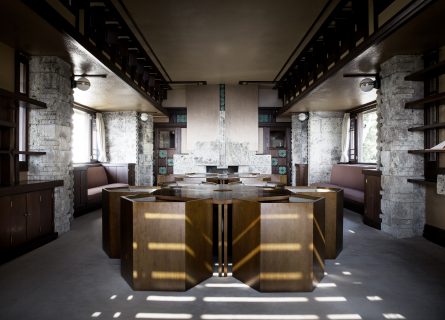
Friday, Mar 28, 2025: Kyoto/Osaka/Kobe/Kyoto
Travel by bus to Osaka for an exclusive tour of Arata Endo’s magnificent Koshien Hotel (1930). Here you can see influences from Wright’s Imperial Hotel and Midway Gardens. Then continue to Kobe to sample meltingly-soft Kobe beef before traveling to nearby Ashiya. Here, we experience Wright’s Yamamura House, built into a hillside overlooking the port of Kobe. Designed by Wright in 1918 and constructed in 1924 by Endo after Wright left Japan, the sprawling, 4,000-square-foot, four-level house bears several similarities to Wright’s Hollyhock House, yet has many features that are distinctively Endo’s. We have special permission to visit the house when it is closed to the public. Return to Kyoto. Gather in the evening for our farewell dinner and toast the end of your great adventure.
Kyoto Hotel Okura | Breakfast, Lunch, Dinner
Saturday, Mar 29, 2025: Depart
The morning is at leisure until our transfers to Itami airport and Kansai International Airport.
…
Daily Itinerary subject to change.
Journey Includes
11 Days
Ten night accommodations in luxury hotels and ryokan
19 Meals
- 9 breakfasts
- 8 lunches
- 2 dinners
17+ Tours
- Imperial Hotel at Meiji Village
- Jiyu Gakuen
- Tokyo Metropolitan Teien Art Museum
- Meiji Shrine
- Sumida Hokusai Museum
- Nezu Museum
- Kachi Villa
- Boat ride on Lake Ashi
- I.M. Pei-designed Miho Museum
- Sumiya Motenashi Art Museum
- Ryoan-ji and Daitoku-ji temples
- Memorial Hall of Kawai Kanjiro
- Byodo-in
- Chochikukyo
- Todai-ji Temple
- Koshien Hotel
- Yamamura House
+
- Transportation by luxury motorcoach
- First class seats on the Shinkansen Bullet Train
- Departure transfers from Kyoto to Itami and Kansai International Airports
- Porterage of one bag per person
- Guides, lectures and entrance fees, taxes, gratuities
In Your Own Words
It was a great introduction to a truly special country. We gained a lot of insight on Japanese culture, customs, architecture, influences and beauty. It was interesting to see what Frank Lloyd Wright accomplished here and how Japan influenced his thought process and his work. We also understand why he loved Japan.
Wright in Japan: The Architect’s Eastern Vision
Overall an awesome trip, memorable, I would certainly recommend to people and consider another trip.
For architecture fans who have an interest in the Japanese aesthetic, this is a fabulous trip. Risa’s knowledge of the food and culture certainly enhanced the experience. Highly recommend this trip if you are both a foodie and Frank Lloyd Wright fan!
Wright in Japan: The Architect’s Eastern Vision
The trip of a lifetime for both of us! We both agreed that we could not have done this trip on our own. We could have visited Japan, but we would not have had access to— or knowledge of— many of the very special sites, esp. those outside the major cities and the architectural treasures. ABSOLUTELY AMAZING TRIP!
Wright in Japan: The Architect’s Eastern Vision
This tour was superb. We would love to go again sometime.
Wright in Japan: The Architect’s Eastern Vision
Upcoming
Travel Wright Journeys